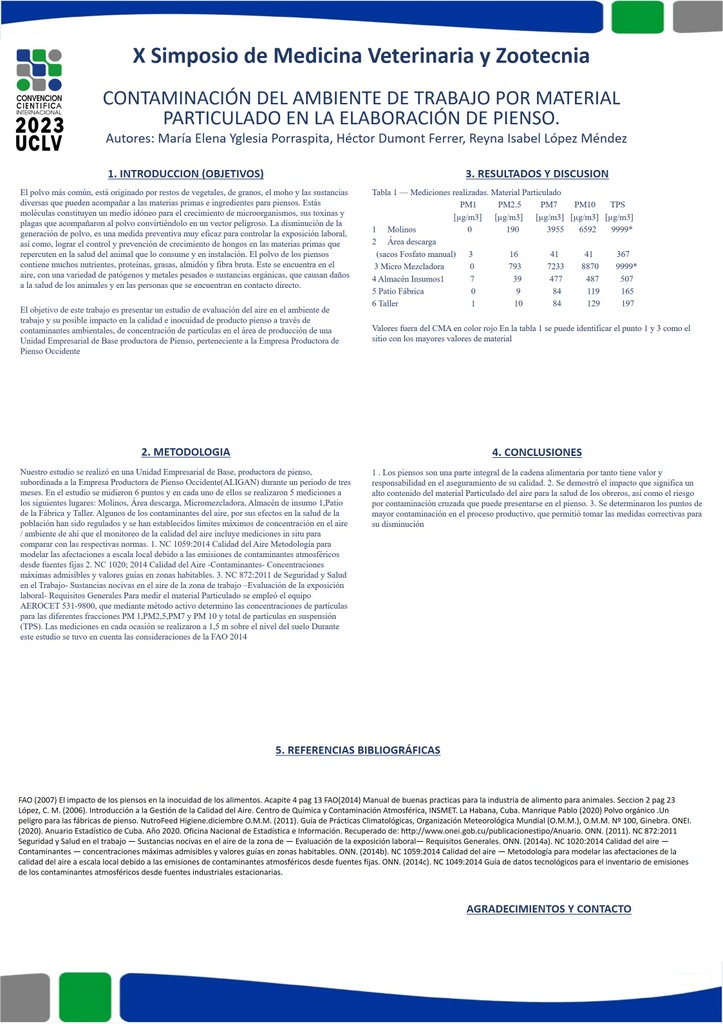Executive Secretary

9th International Scientific Conference on Agricultural Development and Sustainability
10th Symposium of Veterinary Medicine and Zootechnics

Abstract
Contamination of the work environment in feed production facilities can have a negative impact on the health of staff and cause damage to the technological infrastructure, both factors detrimental to work productivity, the risk of cross-contamination of the final product and the consequent impact to food safety. The objective of the study was to evaluate air quality in facilities of the feed production industry, based on the detection of particulate matter and its possible impact on the quality and safety of the final product. Measurements were made at 6 points that include the production line and the outside area of the production line and the outside area of the industrial unit under study. The air quality evaluations were made according to Cuban Standards: 1020:2014 and 1059:2014 on Air Quality, and NC 872:2011 on Occupational Health and Safety. For the measurements, the AEROCET 531-9800 equipment, duly calibrated (EPAUS), was used. Values of particulate matter were found above the Maximum Admissible Concentration in the mill and in the micro mixer, with high concentrations at the time of incorporating the raw material into the process. It concludes with the need to continue this monitoring as part of the measures to be adopted to control and minimize contamination, in order to reduce risks and obtain a final product with the required sanitary conditions for the benefit of the health of workers and the environment. .
Resumen
La contaminación del ambiente de trabajo en las instalaciones productoras de piensos puede repercutir negativamente en la salud del personal y ocasionar daños a la infraestructura tecnológica, ambos factores con perjuicio de la productividad del trabajo, al riesgo de contaminación cruzada del producto final y la afectación consiguiente a la inocuidad alimentaria. El objetivo del estudio fue evaluar la calidad del aire en instalaciones de la industria productora de piensos, a partir de la detección de material particulado y su posible impacto en la calidad e inocuidad del producto final. Se realizaron mediciones en 6 puntos que comprenden la línea de producción y el área exterior de la línea de producción y el área exterior de la unidad industrial objeto de estudio. Las evaluaciones de la calidad del aire se hicieron según las Normas Cubanas: 1020:2014 y 1059:2014 de Calidad del Aire, y NC 872:2011 de Seguridad y Salud en el Trabajo. Para las mediciones se utilizó el equipo AEROCET 531-9800, debidamente calibrado (EPAUS). Se constataron valores de material particulado por encima de Concentración Máxima Admisible en el molino y en la micro mezcladora, con elevadas concentraciones al momento de incorporar la materia prima en el proceso. Se concluye con la necesidad de continuar este monitoreo como parte de las medidas a adoptar para controlar y minimizar la contaminación, a fin de disminuir los riesgos y obtener un producto final con las condiciones sanitarias requeridas en beneficio de la salud de los trabajadores y el ambiente.
About The Speaker

MsC. Maria Elena Yglesia Porraspita

Discussion

